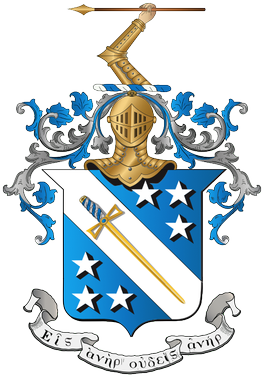
Phi Kappa Tau (ΦΚΤ), commonly known as Phi Tau, is a collegiate fraternity located in the United States. The fraternity was founded in 1906. As of May 2024, the fraternity has 161 chartered chapters, 83 active chapters, 7 associate chapters, and about 3,900 collegiate members. SeriousFun Children's Network, founded by Beta chapter alumnus Paul Newman, is Phi Kappa Tau's National Philanthropy. According to its Constitution, Phi Kappa Tau is one of the few social fraternities that accepts both graduate students and undergraduates.

Lambda Phi Epsilon is the largest Asian-American-Interest fraternity in North America. Lambda Phi Epsilon is affiliated with the National APIDA Panhellenic Association, and is a former member of the North American Interfraternity Conference.

Alpha Sigma Phi (ΑΣΦ), commonly known as Alpha Sig, is an intercollegiate men's social fraternity with 181 active chapters and provisional chapters. Founded at Yale in 1845, it is the 10th oldest Greek letter fraternity in the United States.
Dartmouth College is host to many fraternities and sororities, and a significant percentage of the undergraduate student body is active in Greek life. In the fall of 2022, 35 percent of male students belong to a fraternity and 36 percent of students belong to a sorority. Greek organizations at Dartmouth provide both social and residential opportunities for students and are the only single-sex residential option on campus. Greek organizations at Dartmouth do not provide dining options, as regular meal service has been banned in Greek houses since 1909.

Phi Delta Theta (ΦΔΘ), commonly known as Phi Delt, is an international secret and social fraternity founded in 1848, and currently headquartered, at Miami University in Oxford, Ohio. Phi Delta Theta, along with Beta Theta Pi and Sigma Chi form the Miami Triad. The fraternity has over 200 active chapters and colonies in over 44 U.S. states and five Canadian provinces and has initiated more than 310,000 men between 1848 and 2024. There are over 180,000 living alumni. Phi Delta Theta chartered house corporations own more than 135 houses valued at over $141 million as of summer 2015. There are nearly 100 recognized alumni clubs across the U.S. and Canada.

Phi Gamma Delta (ΦΓΔ), commonly known as Fiji, is a social fraternity with 139 active chapters and 13 colonies across the United States and Canada. It was founded at Jefferson College, Pennsylvania, in 1848. Along with Phi Kappa Psi, Phi Gamma Delta forms a half of the Jefferson Duo. Since its founding, the fraternity has initiated more than 211,000 brothers. The nickname FIJI is used commonly by the fraternity due to Phi Gamma Delta bylaws limiting the use of the Greek letters.

Zeta Beta Tau (ΖΒΤ) is a Greek-letter social fraternity based in North America. It was founded on December 29, 1898. Originally a Zionist youth society, its purpose changed from the Zionism of the fraternity's early years when, in 1954, the fraternity became non-sectarian and open to non-Jewish members, changing its membership policy to include "All Men of Good Character" regardless of religious or ethnic background, while still being recognized as the first Jewish Fraternity.

Sigma Phi Epsilon (ΣΦΕ), commonly known as SigEp, is a social college fraternity for male college students in the United States. It was founded on November 1, 1901, at Richmond College, which is now the University of Richmond, and its national headquarters remains in Richmond, Virginia. It was founded on three principles: Virtue, Diligence, and Brotherly Love. Sigma Phi Epsilon is one of the largest social fraternities in the United States in terms of current undergraduate membership.

Tau Kappa Epsilon (ΤΚΕ), commonly known as ΤΚΕ or Teke, is a social college fraternity founded on January 10, 1899, at Illinois Wesleyan University. The organization has chapters throughout the United States and Canada, making the Fraternity an international organization. Since its founding in 1899, Tau Kappa Epsilon Fraternity has never had an exclusionary or discriminatory clause to prevent individuals from joining and has instead admitted members based on their "personal worth and character". As of spring 2024, there are 209 active ΤΚΕ chapters and colonies with over 301,000-lifetime members.

Fraternities and sororities at the University of Virginia include the collegiate organizations on the grounds of the University of Virginia in Charlottesville, Virginia. First founded in the 1850s with the establishment of several fraternities, the system has since expanded to include sororities, professional organizations, service fraternities, honor fraternities, and cultural organizations. Fraternities and sororities have been significant to the history of the University of Virginia, including the founding of two national fraternities Kappa Sigma (ΚΣ) and Pi Kappa Alpha (ΠΚΑ).
In North America, fraternities and sororities are social clubs at colleges and universities. They are sometimes collectively referred to as Greek life or Greek-letter organizations, as well as collegiate fraternities or collegiate sororities to differentiate them from traditional not (exclusively) university-based fraternal organizations and fraternal orders that have historically acted as friendly societies or benefit societies to certain groups unlike the ones mentioned in this article.
The Dickey Club, often referred to as "The Dickey Tradition" or simply “The Dickey”, was a private social club at Harvard University, originally founded in 1851 as a chapter of the Delta Kappa Epsilon fraternity. The Club included members such as former U.S. President Theodore Roosevelt, newspaper magnate William Randolph Hearst, and financier J.P. Morgan Jr. The Dickey merged with the Institute of 1770 forming the "Institute of 1770, D. K. E.", only to be absorbed by the Hasty Pudding Club in 1924.














